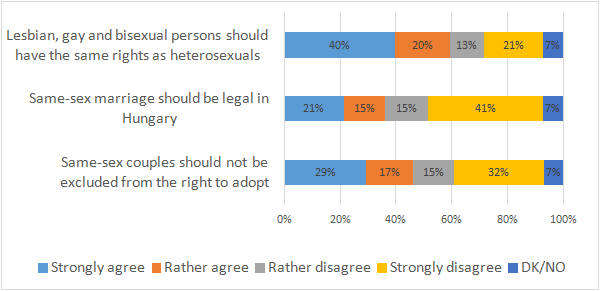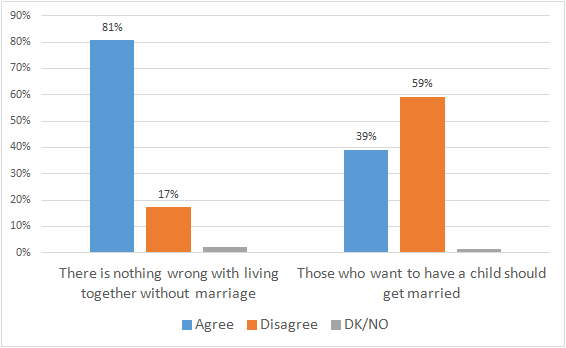36% of Hungarians support same-sex marriage, while 56% are against it – according to the latest national representative opinion poll conducted by Budapest Pride and Integrity Lab. The support for legalizing the right is significantly higher: 46% of the respondents would not exclude same-sex couples from having such a possibility. Both results are better than in previous years, and the fact that the latter is even higher is an exception in the region: earlier researches showed that in Eastern-European countries the support for intoducing the right for same-sex couples is usually lower than for the right to marry. 60% of the population agrees with the principle that lesbian, gay and bisexual persons should have the same rights as anyone else.
 Figure 1. Results in total population
Figure 1. Results in total population
Women and Graduates Are More Supportive
Almost 40% of women support same-sex marriage as compared with one-third of men. The ratio of supporters is also significantly higher among graduates than the average: 43% of them approve of the right of same-sex couples to marry.
In spite of international trends, the support was not higher in the youngest generation than in the older ones – although the population of Budapest used to be perceived as the most progressive in terms of social issues, those living in countryside towns are more supportive towards same-sex marriage than those living in the capital, according to our research. Both trends have been more and more visible recently: Hungarian youth is more conformist in terms of social issues than the EU average, and Budapest is becoming less liberal and progressive compared to the other parts of the country.
Religion Polarizes
Self-proclaimed ecclesiastic religious people have the most negative attitude towards the right: three-fourth of them would not approve it. Unlike them, among those who say they are ‘definitely not religious’, the proportion of supporters is outstanding – it is just as much as those against the extension of the right.
Right-Left Cleavage
There is a clear difference between the voters of right and left-liberal parties: the former are more likely to be against same-sex marriage, while the latter are more supportive. 71% of Fidesz supporters are against (the highest proportion of all parties). The majority of left-liberal opposition parties are in favor of the extension, while the voters of the biggest opposition party (MSZP) are the most divided – however, there are even more supporters among them than the national average.
Hungarian Society Is Less Traditional Than Believed by Right-Wing Parties
Special importance of being married while in a relationship is basically denied by the results: more than 80% of Hungarians think it is not necessary to get married to live together, and two-third of them approve of even having a child without marriage. Almost 60% of the respondents debunk the argument – which is often used by political opponents – that same-sex marriage would threaten Hungarian families and children.
 Figure 2. Results in total population
Figure 2. Results in total population
Respondents do not see the movement to promote same-sex marriage as a political one. Two-thirds of Hungarians consider love and commitment to be the main motivations for same-sex couples to get married and only 13% thought it is for political reasons.
26 % of Hungarians Have LGB Acquaintances
One quarter of the population answered ‘yes’ to the question whether they have any lesbian, gay or bisexual acquaintances. They are also by 10% more supportive with same-sex marriage: 46% would approve it. This proves the positive correlation between personally knowing LGBTQ persons and supporting either same-sex marriage specifically, or the issue of general equality or extension of rights.



